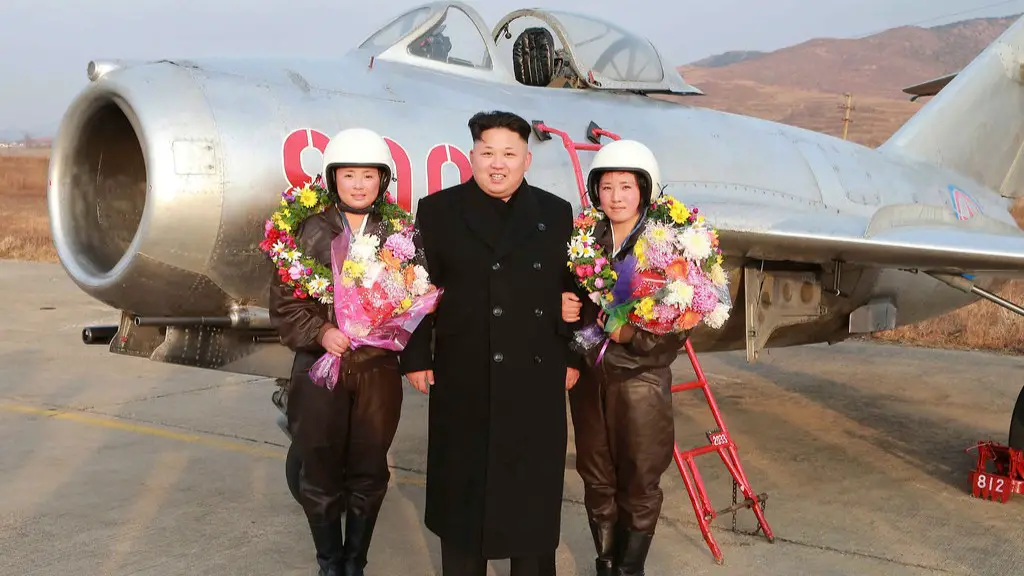The Origins of US-North Korea Tensions
Conflict between the United States and North Korea is nothing new. Since the end of the Korean War in 1953, the two sides have had a rocky relationship. America initially promised economic aid and a peace treaty, but the North Koreans felt betrayed and began seeking nuclear weapons. The US government responded by implementing a series of sanctions that created immense economic and diplomatic pressure. This in turn led to further tensions and the beginning of very dangerous rhetoric and posturing from both sides.
In recent years the tensions have only worsened. As North Korea continues to develop weapons of mass destruction, the US and its allies have become increasingly concerned about the potential threat from the Hermit Kingdom. The North Koreans have responded by issuing threats and conducting missile tests, which in turn has led to more international condemnation and further sanctions from the US and its allies.
Impact of Conflict on the Region
The recent conflict between the United States and North Korea has had serious consequences for the region. Not only has it led to economic disruption and further sanctions, but it has also caused immense political instability and posed a direct threat to international peace and security.
The conflict has had a tremendous impact on the people of North Korea as well. Despite the regime’s claims of “economic progress”, the reality is that the majority of the population continues to suffer from extreme poverty and deprivation. Sanctions have exacerbated this problem and have caused many to flee to neighboring countries in search of a better life.
The crisis has also had a profound effect on South Korea. The two countries have been technically in a state of war for decades, but the current tension has made it more difficult for them to cooperate for the betterment of the Korean people. South Koreans are also deeply concerned about the destabilizing effect of the US-North Korea conflict on their own security.
Who Will Win?
The answer to this question is impossible to predict with any certainty. It is clear, however, that both sides have a lot to gain and lose from the conflict.
For the United States, the conflict has presented an important opportunity to demonstrate its commitment to global security and the protection of its allies. It could also bring a diplomatic victory if it is able to negotiate an end to the North Korean nuclear program and enforce a peace treaty. Conversely, a failed attempt to resolve the conflict could also have serious implications for American credibility.
For North Korea, the conflict presents an equally important opportunity. The regime has used the crisis as a way to garner international attention and to demonstrate its own strength and prowess. A successful negotiation could mean more economic aid and a much needed reprieve from years of international sanctions. However, if negotiations fail and further sanctions are imposed, the regime could be at risk of further damage and erosion of its power base.
Experts’ Perspectives
Experts on both sides of the conflict have their own ideas about who will come out on top. Many American analysts believe that the US is well positioned to emerge victorious if negotiations are successful. They point to America’s strong diplomatic leverage, as well as its willingness to use military force if necessary.
North Korean analysts, on the other hand, believe that the regime holds the key to victory. They point to the regime’s diplomatic savvy and its willingness to use brinkmanship tactics to get what it wants. They also view the recent missile tests as a sign of strength and assertiveness that could pay off in the long run.
The Role of China
The role of China in the conflict between the United States and North Korea has also been highly debated. Chinese leaders have been relatively quiet throughout the crisis, but there have been indications that they are in favor of a diplomatic resolution.
China is North Korea’s primary economic and diplomatic ally, and it has sought to pressure the regime into pursuing a more diplomatic approach to the crisis. It has also offered to mediate negotiations between the two sides in order to find a peaceful resolution.
The Significance of International Support
The international community has been largely unified in its condemnation of North Korea and its nuclear program. This has provided the US, South Korea, and other countries with added legitimacy in their efforts to resolve the crisis.
International support has also been a key factor in determining the US-North Korea conflict. If the US can garner enough support from other nations, it could help to strengthen its diplomatic leverage and prevent North Korea from carrying out its nuclear ambitions.
Analyzing the Potential Outcome
It is difficult to predict the outcome of the US-North Korea conflict. Both sides have a lot to gain, and the stakes are very high.
The success of any attempt at negotiation is dependent upon a number of factors, including the willingness of all parties to compromise and the commitment of the international community to fully enforce any potential agreement. It is also essential that the North Korean regime be willing to give up its nuclear ambitions in exchange for economic relief and other incentives.
Chance for a Peaceful Future?
Ultimately, the chances of a peaceful outcome to the US-North Korea conflict depend upon the degree of political will on all sides. If negotiators can come to an agreement that meets the needs and concerns of all parties, then there is a chance that this crisis could end peacefully.
Many analysts believe that a successful negotiation could ultimately bring the two sides closer together and lead to improved diplomatic relations. While this is certainly possible, it is also important to remain realistic and to recognize the many challenges that will need to be overcome before this can become a reality.
The Role of US Military
The US military plays an important role in the US-North Korea conflict. The US government has consistently stated that any military action would be a last resort, but it remains prepared to act in defense of its allies.
However, US military action is not the only solution to the crisis. The conflict has highlighted the need for more diplomatic solutions and the importance of engaging North Korea in dialogue. Without diplomacy and further negotiations, the conflict could easily spiral out of control.
Impact on the Global Economy
The US-North Korea conflict has had a significant impact on the global economy. The conflict has disrupted global financial markets, caused international trade to slow, and created political uncertainty that has put investors on edge.
Sanctions have also been used as a tool to pressure North Korea and have caused significant economic harm. The economic disruption caused by the sanctions has had far-reaching effects, and some analysts have argued that the sanctions may have actually backfired and resulted in increased isolation and further economic hardship for the North Korean people.
Implications of Conflict on Human Rights
The conflict between the United States and North Korea has also had a serious impact on human rights in the region. The North Korean regime has a long history of human rights abuses, and the conflict has only made this situation worse.
The US government has sought to pressure the North Korean regime through the use of sanctions and other measures. However, these measures have had unintended consequences, including further violating the rights of already vulnerable people.
It is clear that the US-North Korea conflict has far-reaching implications for the region and the world. With the future of the conflict uncertain, it is essential that all sides strive for peace and stability. Without further dialogue and negotiations, it is unlikely that the conflict will come to a peaceful resolution anytime soon.


